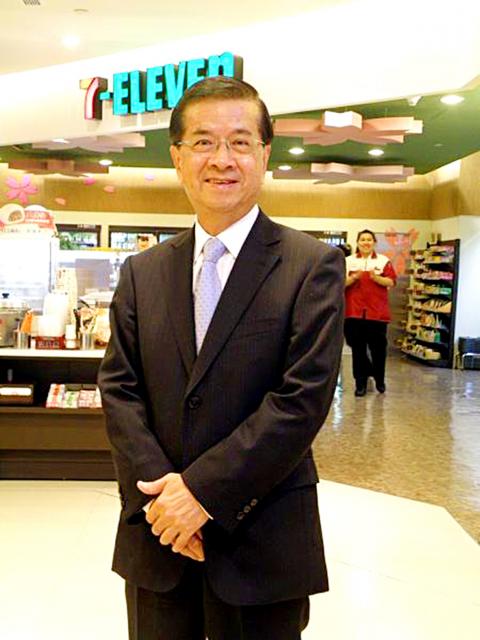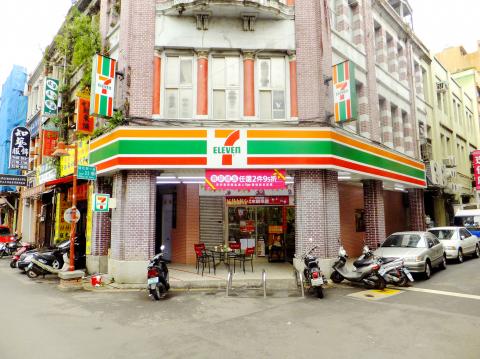Feb. 5 to Feb. 11
It’s hard to believe that today’s ubiquitous 7-Eleven was once labeled as the “prodigal son of Uni-President Enterprises Corp.” But during its early days, the convenience store cost the corporation more than NT$2 billion in total losses.
Launching its first store in February 1980 on Taipei’s Changan E Road, the venture had already eaten into about half the original capital of NT$1.9 billion by September 1982.

Photo: Yang Ya-min, Taipei Times
“Besides Uni-President, other shareholders had little desire to keep the stores running,” Lee Jen-fang (李仁芳) writes in the book, 7-Eleven Takes Over Taiwan (7-Eleven 統一超商縱橫台灣).
At the same time, foreign and local investors bombarded Uni-President with calls about acquiring the stores. But the corporation refused all offers, instead buying out the other shareholders and taking full control over the venture by incorporating it into the company as its “supermarket department.”
It would take several more years for the company to finally turn a profit, but this was the beginning of its 7-Eleven empire in Taiwan.

Photo courtesy of Wikimedia Commons
RISE OF THE MINIMART
The late 1970s saw the rise of the two food giants of Uni-President Enterprises Corp (UPE, 統一企業) and Wei Chuan Foods Corp (味全食品) in response to increased competition in the consumer market.and need for more streamlined and efficient operations.
However, the first mini-market chain was launched by the Council of Agriculture, Taipei City Government and Youth Development Administration in 1977. According to the a 60th Anniversary publication by Wei Chuan (who later purchased the chain), government officials launched this venture after visiting the US and noticing how clean their supermarkets were compared to the traditional markets of Taiwan.
In 1979, UPE simultaneously opened 14 “modern convenience stores” across the country. Run as a subsidiary, the company held half the shares and gave the rest to dealers, family and friends. The corporation not only wanted to create a clean and bright shopping experience, but also hoped to have complete control over the channels of distribution for its products by running its own stores.
It was a daring venture as the average annual income was less than US$2,500 back then, says Hsu Chung-jen (徐重仁), who played a key role in the rise of 7-Eleven.
“As a food producer, Uni-President jumped straight into the unfamiliar world of retail and chain stores, and opened 14 stores at once with the intent of opening more. They did not even understand the basic differences between an independent store and a retail chain,” he says.
Hsu says they started out working almost 20 hours a day. He and two colleagues borrowed two desks at the parent company to conduct business, but when the company needed the desks they were relegated to a couch by the receptionist.
Hsu adds that the stores struggled because they were not able to fully identify customer needs.
“To fulfill the one-stop-shop needs of our customers, if someone wanted a broom we would start selling brooms. By the end, we had seven or eight types of detergent and milk formula and even sold vegetables, fresh meat and fish,” Hsu says.
GROWING PAINS
Hsu tried to collaborate with US corporations, but talks were stalled due to the US cutting diplomatic ties in 1979. Finally, Southland Corporation, which ran 7-Eleven in the US, reached out and the two companies signed a deal to run the stores under the 7-Eleven module and moniker.
Southland’s directive was to establish uniform, modern stores that would eventually replace traditional “mom-and-pop” businesses. They targeted housewives primarily and the initial stores were all located in residential areas. As its name suggests, the initial stores opened at 7am and closed at 11pm. And like its US counterparts, it sold Slurpees and other signature items.
However, Hsu noticed that due to the different nature of residential areas in the US and Taiwan, the US-mandated module was not attracting as many customers as they expected. Their prices were also higher — and Taiwanese housewives then were much more sensitive to prices than their US counterparts.
In 1981, the stores experimented with 24-hour service, but its products did not attract late night shoppers and soon reverted to its original hours. The franchising module did not work either as it was uncommon in Taiwan at that time.
Hsu wanted to localize the stores by eschewing the Western fast food for tea eggs and meat buns, but Southland objected on the grounds that it would ruin the image of the store. Hsu insisted, and tea eggs are a staple of all convenience stores today.
The store experienced massive losses, but still had the full support of management. Hsu returned to the fold after a short departure and got rid of 35 underperforming locations, mostly in residential communities. They analyzed the sales revenue from each store and were confident enough in 1983 to make one of the stores permanently 24-hours.
The evolution continued from there. As more women went to work, 7-Eleven in 1985 launched its signature series of microwavable meals. It opened stores in more visible areas and poured money into advertising, also adjusting its target market to the 18 to 35 crowd who were less sensitive to higher prices.
In 1986, six years after the initial venture, the chain made a profit for the first time. There was still a long road to climb, but 7-Eleven was the prodigal son no more.
“We can make up what we lost during those six years in a month or two now,” the late Uni-President founder Kao Ching-yuan (高清愿) said in 1995.
Today, there are 5,235 7-Elevens across the nation, and UPE just opened its first staffless store at their headquarters in Taipei on Monday.
Taiwan in Time, a column about Taiwan’s history that is published every Sunday, spotlights important or interesting events around the nation that have anniversaries this week.

On April 26, The Lancet published a letter from two doctors at Taichung-based China Medical University Hospital (CMUH) warning that “Taiwan’s Health Care System is on the Brink of Collapse.” The authors said that “Years of policy inaction and mismanagement of resources have led to the National Health Insurance system operating under unsustainable conditions.” The pushback was immediate. Errors in the paper were quickly identified and publicized, to discredit the authors (the hospital apologized). CNA reported that CMUH said the letter described Taiwan in 2021 as having 62 nurses per 10,000 people, when the correct number was 78 nurses per 10,000

As we live longer, our risk of cognitive impairment is increasing. How can we delay the onset of symptoms? Do we have to give up every indulgence or can small changes make a difference? We asked neurologists for tips on how to keep our brains healthy for life. TAKE CARE OF YOUR HEALTH “All of the sensible things that apply to bodily health apply to brain health,” says Suzanne O’Sullivan, a consultant in neurology at the National Hospital for Neurology and Neurosurgery in London, and the author of The Age of Diagnosis. “When you’re 20, you can get away with absolute

May 5 to May 11 What started out as friction between Taiwanese students at Taichung First High School and a Japanese head cook escalated dramatically over the first two weeks of May 1927. It began on April 30 when the cook’s wife knew that lotus starch used in that night’s dinner had rat feces in it, but failed to inform staff until the meal was already prepared. The students believed that her silence was intentional, and filed a complaint. The school’s Japanese administrators sided with the cook’s family, dismissing the students as troublemakers and clamping down on their freedoms — with

As Donald Trump’s executive order in March led to the shuttering of Voice of America (VOA) — the global broadcaster whose roots date back to the fight against Nazi propaganda — he quickly attracted support from figures not used to aligning themselves with any US administration. Trump had ordered the US Agency for Global Media, the federal agency that funds VOA and other groups promoting independent journalism overseas, to be “eliminated to the maximum extent consistent with applicable law.” The decision suddenly halted programming in 49 languages to more than 425 million people. In Moscow, Margarita Simonyan, the hardline editor-in-chief of the